Wisdom teeth growing crookedly, causing complications such as pain, infection, cysts, and affecting neighboring teeth are cases that need to be removed. Wisdom teeth have not caused complications, but there is a space between wisdom teeth that traps food, which will affect adjacent teeth, so they should also be extracted to prevent future complications. If your wisdom teeth are impacted and cannot be adequately cleaned, you should have them removed. Wisdom tooth extraction is not dangerous but should be done exactly as prescribed by your doctor. In the case of wisdom teeth growing straight, normally there is no need to be removed, as long as they do not cause pain or other dental problems.
When Do Wisdom Teeth Grow? Location and Role (If Any)
Wisdom teeth, also known as tooth number 8, are the last teeth to grow in the human body’s tooth system. They usually appear between the ages of 17 and 25, but there are also cases of them appearing earlier or later, or even not growing at all. The growing position of wisdom teeth is at the back of the jaw, behind molar number 7. The appearance of tooth number 8 marks the final stage of development of the tooth system.
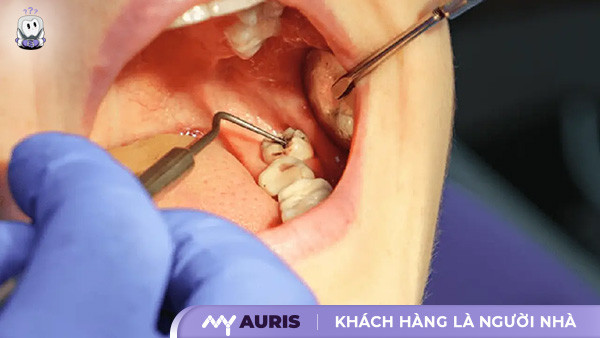
The Development of Wisdom Teeth Through Stages
Wisdom teeth develop through many stages, starting from tooth buds formed in the jawbone at an early age. In the early stages, tooth buds develop slowly. During puberty, wisdom teeth begin to grow faster and gradually move toward the gums. The process of wisdom teeth eruption can take place over several months or several years. The shape, size and level of growth of wisdom teeth vary from person to person. Oral health status also affects the development of tooth number 8. There are many cases where wisdom teeth grow completely underground, grow at right angles, put pressure on other teeth, cause nerve pain or cause serious infection.
What Effects Do Wisdom Teeth Have During Life? Modern?
In ancient times, when the human body needed a strong tooth system to chew hard foods, wisdom teeth played an important role in crushing food. However, in modern times, with a more processed and softer diet, the role of wisdom teeth in chewing is no longer necessary. Even because the growing position is difficult to clean, wisdom teeth often cause gingivitis, toothache, infection and other oral diseases.
Signs to Identify Wisdom Teeth Growing
BDo you feel pain in your jaw? Red, swollen gums? It is possible that wisdom teeth, also known as teeth number 8, are growing. Wisdom teeth are the last teeth to grow in the human body’s dental system, usually appearing between the ages of 17 and 25. Growing wisdom teeth can cause many unpleasant symptoms, affecting oral health and daily activities. Understanding these signs helps you decide whether to extract or not, and prepare psychologically and economically for dental care.
Common symptoms
Location The growth, shape and size of wisdom teeth affect the level of growth and the symptoms you experience. Here are some common signs that wisdom teeth are growing:
- Toothache: Toothache, especially at the end of the jaw, is the most obvious symptom. The pain can be dull or severe, spreading to the ears, head and neck. Wisdom tooth pain can cause difficulty chewing.
- Swollen gums: Gums around wisdom teeth are swollen, red, and painful to the touch. Gingivitis due to wisdom teeth is a common complication, causing discomfort and affecting oral hygiene.
- Difficulty in opening the mouth: Wisdom teeth that are impacted or completely impacted can cause difficulty in opening the mouth. This condition affects eating and speaking.
- Bad breath: Food easily gets stuck between wisdom teeth and gums, creating an environment for bacteria to grow, causing bad breath.
- Slight fever: Infection caused by wisdom teeth growing can cause a mild fever. If there is a high fever accompanied by severe pain, you should see a dentist immediately.
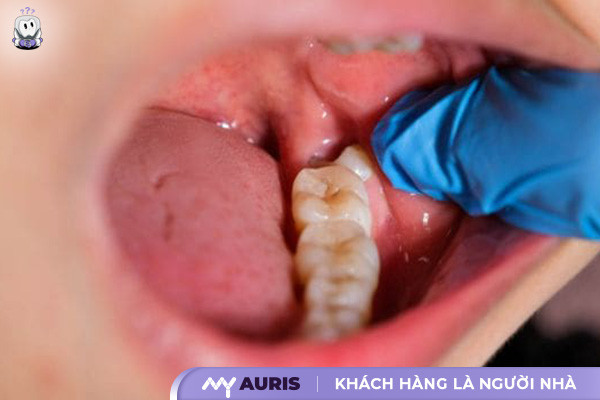
Distinguishing wisdom tooth pain from other dental problems
Tooth pain is not always caused by wisdom teeth. Many other oral diseases have similar symptoms. To distinguish wisdom teeth pain from other problems, you need to note:
- Location of pain: Wisdom tooth pain is often concentrated at the end of the jaw, behind the molars. Pain from tooth decay or pulpitis often occurs in other teeth.
- Pain duration: Wisdom tooth pain usually lasts a fewdays or weeks, depending on growth level and health status. Pain from tooth decay can last and gradually increase over time.
- Accompanying symptoms: Growing wisdom teeth is often accompanied by swollen gums, difficulty opening the mouth, and sometimes a mild fever. Tooth decay can cause sensitivity when eating sweets or cold foods. Pulpitis can cause severe pain, spreading to the head and face.
To accurately diagnose the cause of toothache, you should go to a dental clinic or maxillofacial hospital for examination and X-rays. The dentist will evaluate the oral condition, determine the cause and provide an appropriate treatment plan. Self-diagnosis and treatment at home can cause complications after wisdom tooth extraction or other serious problems.
Cases where wisdom tooth extraction is required
Teeth Teeth growing crookedly or impacted causing complications:
Teeth growing crooked, especially completely impacted or growing at right angles, often puts pressure on other teeth. This not only causes nerve pain and toothache but also causes the teeth to shift, affecting the incisors, canines, premolars and molars. Impacted wisdom teeth also create conditions for bacteria to grow, causing gingivitis caused by wisdom teeth, serious infections, and even abscesses. In these cases, wisdom tooth extraction is the optimal solution to preserve oral health.
Infection, gingivitis, abscess around wisdom teeth:
The difficult-to-clean growth location of wisdom teeth creates favorable conditions for bacteria to grow, causing gingivitis, infection, and even pressure. car. Gingivitis caused by wisdom teeth not only causes pain and discomfort but also affects oral health in general. Severe infections can spread, endangering overall health. At this time, wisdom tooth extraction is a necessary measure to control infection and protect oral and facial health.
Negative impact on neighboring teeth:
Misaligned wisdom teeth can put pressure on neighboring teeth, causing adjacent teeth to shift, break, and even cause bone loss. function. function. This not only affects the chewing function but also causes loss of aesthetics. In this case, wisdom tooth extraction helps preserve neighboring teeth, maintaining the health and aesthetics of the dental system. Wisdom tooth extraction needs to be performed by an experienced dentist at a reputable dental clinic or dental hospital.
When Can Wisdom Teeth Not Be Extracted?
Are you worried about wisdom teeth growing? Toothache, gingivitis, and infection are common complications when tooth number 8 grows crooked. However, wisdom teeth extraction is not always necessary.
Wisdom teeth grow straight, without causing pain or complications.
In case wisdom teeth grow straight, in the right position on the jaw, without causing pain,If there is no gingivitis, no negative impact on neighboring teeth (molar number 7), does not cause infection or any other complications, then you do not need to have wisdom teeth extracted.
Wisdom teeth are fully grown and have the function of eating chewing
Wisdom teeth, although often growing crooked or impacted, in some cases, they can fully grow and perform the chewing function like other teeth. This means that tooth number 8 has completely erupted, is not completely impacted, is not growing at a right angle and is not putting pressure on other teeth. When wisdom teeth are fully grown, they participate in the process of crushing food, helping the tooth system function effectively. Extracting wisdom teeth in this case is unnecessary and may even cause unnecessary risks such as bleeding, infection, nerve damage, and effects on the jawbone, teeth, gums, and surrounding soft tissues.
Is Wisdom Tooth Extraction Dangerous?
Removing wisdom teeth, or tooth number 8, is an important decision that affects dental health mouth. This decision involves many factors: medical, psychological, economic and time. Understanding the potential risks helps you prepare better and minimize complications after wisdom tooth extraction.
Potential Risks
Tooth extraction, especially wisdom teeth grows crookedly or underground, posing some risks. The human body reacts differently to tooth extraction. Knowing the risks in advance helps you prepare mentally and cooperate with your dentist.
Bleeding: Bleeding after tooth extraction is normal. However, in some cases bleeding is prolonged or excessive. Patients with a history of blood clotting disorders need to notify the dentist.
Infection: Bacteria can enter the tooth extraction site, causing infection. The infection can cause toothache, swollen gums, gingivitis and fever. Maintaining proper oral hygiene after tooth extraction is very important to prevent infection.
Nerve damage: Wisdom teeth are located near important nerves in the jawbone. In rare cases, wisdom tooth extraction can cause nerve damage, leading to numbness and loss of sensation in the tongue, lips, and chin. This risk is higher when removing wisdom teeth that are completely impacted or growing at a right angle.
Dry socket: Dry socket is a painful complication that occurs when the blood clot protecting the tooth extraction site is detached. This condition exposes the jawbone and nerves, causing intense pain.
Damage to neighboring teeth: During the wisdom tooth extraction process, neighboring incisors, canines, premolars, and molars may be affected. This risk depends on the location, shape, size and level of growth of the wisdom teeth.
How to Minimize the Risk of Wisdom TeethWisdom Teeth Tiger
Choosing the right dental facility and experienced doctor is the most important step to minimize the risks of wisdom teeth extraction.
Choose a Reputable Dental Facility with Experienced Doctors
Find out carefully: Take time to learn about the dental clinic or molar hospital face. Consult friends, relatives or search for information online. Check the practicing certificate, experience and expertise of the dentist.
Dental technology: Modern dental clinic with advanced dental technology helps make accurate diagnoses, perform tooth extractions safely and minimize complications. X-rays to evaluate the condition of wisdom teeth, tooth system, gums, jawbone and nerves are necessary.
Candid discussion: Discuss frankly with the dentist about oral health status, medical history, and current medications. Ask questions about the tooth extraction process, risks, costs, and care after wisdom tooth extraction. Make sure you understand all the information before making a decision. The doctor will advise whether to extract or not based on the condition of tooth number 8: completely impacted, growing at a right angle, putting pressure on other teeth, causing nerve pain, causing serious infection…
Follow the instructions: Strictly follow the dentist’s instructions on care after wisdom tooth extraction. Diet, oral hygiene, medication use, and scheduled follow-up appointments play an important role in preventing complications and recovering quickly. Keeping, growing, preserving, nurturing and caring for teeth is necessary.
Wisdom tooth extraction is a common dental procedure, helping to preserve oral health and the dental system. Although there are potential risks, choosing a reputable dental facility, an experienced doctor and following post-operative care instructions will help minimize risks and ensure safety for the human body. Don’t hesitate to seek professional advice if you are having problems with your wisdom teeth.
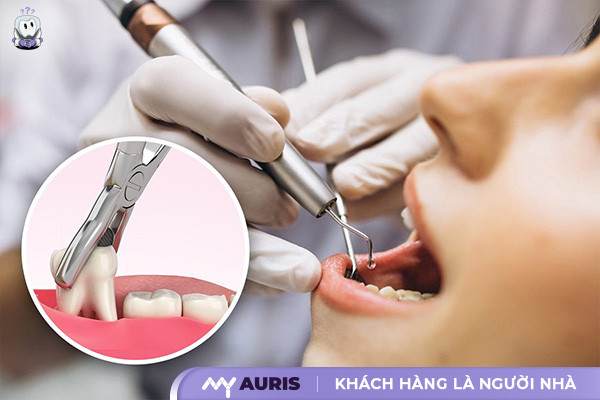
Preparation Before Wisdom Tooth Extraction: 3 Important Steps
1. Examination and Consultation with a Specialist
Examination and consultation with an oral and maxillofacial doctor at a dental clinic or maxillofacial hospital is the first and most important step. The doctor will evaluate the conditionYour oral health status, growth location, shape and size of your wisdom teeth. Thereby, the doctor makes a decision whether or not to extract wisdom teeth, the appropriate extraction method, and answers all questions about the process, risks, costs and care after wisdom tooth extraction.
2. X-rays to Evaluate the Condition of Wisdom Teeth
X-rays are a necessary step for the doctor to clearly observe the growth position, shape, size of the wisdom tooth, as well as its relationship with neighboring teeth, jawbone, nerves and other structures in the jaw. X-ray images help doctors determine whether wisdom teeth are growing straight, growing at right angles, growing completely impacted or putting pressure on other teeth, thereby providing an appropriate dental treatment plan.
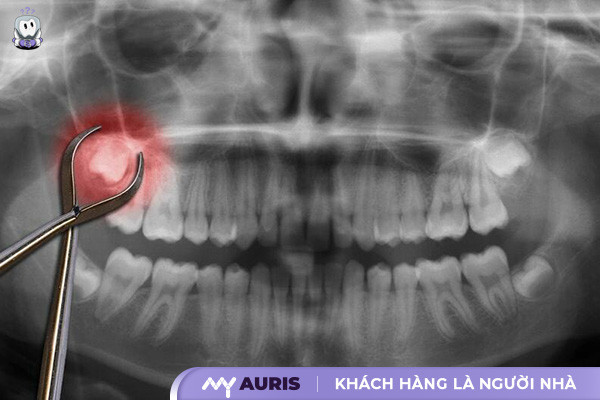
3. Blood Tests (If Necessary)
In some cases, your doctor may ask you to perform blood tests to evaluate your general health, especially your blood clotting ability. Blood tests help detect potential diseases, ensure safety during the tooth extraction process and minimize the risk of complications after wisdom tooth extraction, such as bleeding and infection. The doctor will carefully consider your health condition, including factors such as diabetes, cardiovascular disease, blood clotting disorders… before deciding to remove wisdom teeth.
Wisdom Tooth Extraction Process at the Dentist
Cleaning, Antiseptic and Anesthesia
The first step in the wisdom tooth extraction process is oral hygiene and disinfection. The dentist will clean the gum area around the wisdom tooth with a specialized antiseptic solution. This helps eliminate bacteria, minimizing the risk of infection after extraction. After cleaning, the dentist will anesthetize the tooth extraction site and surrounding areas. Anesthesia helps you not feel pain during the extraction of tooth number 8.
Wisdom Tooth Extraction
After anesthesia, the dentist will proceed with the extraction. wisdom teeth. Depending on the position of the tooth (straight growth, right angle growth, completely impacted growth) and the level of complexity, the dentist will use appropriate techniques and tools. With straight teeth, tooth extraction is usually simple and quick. However, with misaligned or impacted teeth, the doctor may need to make an incision in the gums or cut the jawbone to remove the tooth. This process requires the doctor’s experience and technical expertiseTo avoid damage to neighboring teeth, gums, jawbone and nerves. In some cases, impacted wisdom teeth can put pressure on other teeth, causing nerve pain or serious infections, making tooth extraction necessary to preserve oral health. Wisdom tooth extraction, whether growing straight or crooked, needs to be performed by a dentist at a reputable dental clinic or maxillofacial hospital.
Bleeding and Postoperative Care Instructions
After wisdom tooth extraction, the dentist will stop the bleeding and provide post-operative care instructions. The doctor will place gauze on the tooth extraction site to stop the bleeding and may stitch the wound if necessary. You will be given detailed instructions on how to care for your teeth after extraction, diet, how to use medicine (if any) and follow-up check-up schedule.
Wisdom Tooth Extraction Postoperative Care: Detailed Instructions From the Expert
After wisdom tooth extraction, proper post-operative care plays an important role in minimizing pain, risk of complications after wisdom tooth extraction and helping the teeth, jaw, gums, jawbone and nerve system recover quickly. The instructions below will provide you with the necessary information to take care of your oral health after wisdom tooth extraction.
Diet and Oral Hygiene After Wisdom Teeth Extraction
After wisdom teeth extraction, the jawbone and gums need time to heal. Proper eating and oral hygiene will help minimize toothache, gingivitis caused by wisdom teeth and the risk of infection.
- During the first 24 hours: Drink plenty of water. Avoid hot drinks, carbonated drinks, and alcohol. Eat soft, liquid foods that are easy to swallow such as porridge, soup, and yogurt. Do not rinse your mouth vigorously. Limit spitting. Avoid touching the extraction site with your tongue or hands. Wear a mask when going out to protect the wound.
- From day 2 onwards: Gradually add other soft foods to the diet. Begin brushing gently, avoiding the extraction area. Gently rinse your mouth with saline or mouthwash as prescribed by your dentist. Maintain good oral hygiene to nurture and preserve oral health.
- After 1 week: You can eat and drink almost normally, but you should still avoid foods that are hard, chewy, and difficult to chew. Continue to maintain good oral hygiene and follow up with your dentist’s appointments. This care helps to effectively preserve and implant teeth (if necessary).
Use Medicine As Prescribed by Doctor
Doctor The dentist will prescribe pain relievers, anti-inflammatory drugs, and antibiotics (if necessary) after wisdom tooth extraction. Take the medicine in the right dosage and at the right timeindicated waist. Do not arbitrarily stop taking the medication or change the dosage. If you have any questions, contact your doctor or dentist for advice. This helps minimize risks and pain, while protecting oral health.
Follow-up Examinations According to Appointment
Re-examination according to appointments with a maxillofacial doctor or dentist at the office Visiting a dentist or maxillofacial hospital is very important. The doctor will examine the wound, evaluate the healing process and handle complications (if any). Adhering to the follow-up schedule helps ensure smooth healing and minimizes the risk of infection and other complications. At the same time, the doctor can give advice on appropriate oral care regimen, helping to maintain long-term oral health. This is very important in preserving and nurturing the tooth system.
Wisdom Tooth Extraction Price List According to Each Case
Wisdom tooth extraction, Also known as tooth number 8, is an important decision that affects oral health. The cost of wisdom tooth extraction depends on the location, shape, size and level of tooth growth. This article provides information about the price list for wisdom tooth extraction, helping you prepare well economically before the procedure. Let’s find out to make the right decision, preserve and nurture your tooth system.
Straight Wisdom Teeth Extraction
Straight wisdom teeth are often easier to extract than with crooked or impacted teeth. Simple process, quick implementation time and low risk. The dentist just needs to anesthetize and use tools to remove the tooth from the jawbone. Recovery time after extraction is also faster. However, the cost still depends on the dental facility and dental technology used.
- Cost: Usually ranges from [Low price range] to [High price range] for one tooth.
- Risk: Lower than extracting crooked or impacted teeth. Complications after wisdom tooth extraction are less common.
- Time: The extraction process takes place quickly, about [time].
- Post-extraction care: Simple, easy to follow the dentist’s instructions.

Removal of impacted and impacted wisdom teeth
Misaligned and impacted wisdom teeth are more complicated. Teeth growing at right angles, completely or partially impacted, all make extraction difficult. Putting pressure on other teeth, causing nerve pain, gingivitis and serious infections are common complications. Need an experienced dentist to perform it. A dental clinic or maxillofacial hospital equipped with modern dental technology will provide good support for tooth extraction.
- Cost: Usually higher than straight teeth, ranging from [Low price range] to [High price range] per tooth, depending on difficulty level.
- Risk: Higher due to complex growth location. Nerve damage, infection, and toothache are risks to be aware of.
- Time: Lasts longer, can take from [time] to [time].
- Post-extraction care: Requires more thorough care, strictly following the dentist’s instructions to avoid gingivitis caused by wisdom teeth and other complications.
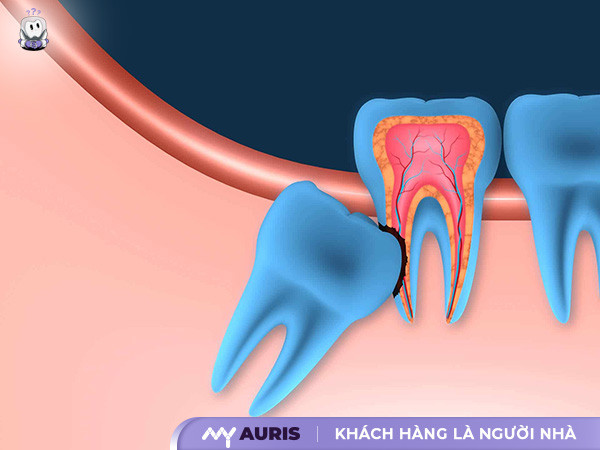
Surgical Wisdom Tooth Extraction
In some cases, wisdom teeth are complicated to grow, the doctor must perform surgery to remove the tooth. This method requires high technology, modern equipment and longer recovery time. The decision to surgically remove wisdom teeth requires careful advice from a specialist.
- Cost: Highest of the three cases, ranging from 1,000,000 VND to 7,000,000 VND depending on the complexity and technology applied.
- Risks: Possible risks such as bleeding, infection, nerve damage. Choosing a reputable dental clinic and experienced doctor helps minimize risks.
- Time: Surgery and recovery time are longer than other methods.
- Post-extraction care: It is necessary to strictly follow the oral care regimen and use medication as prescribed by the doctor to ensure oral health and the human body.
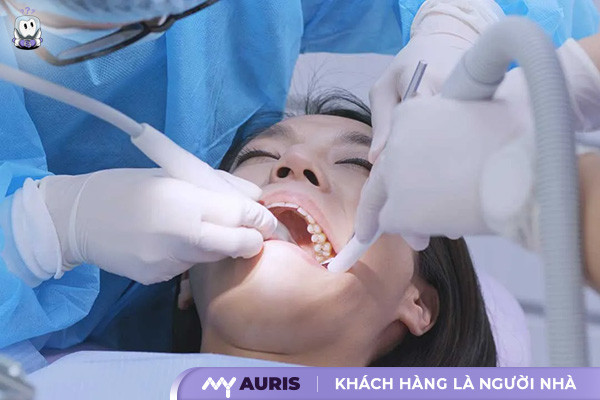
Answering Questions About Wisdom Tooth Extraction
Does wisdom tooth extraction affect the nerves? no?
Risk of nerve damage is a potential complication when removing wisdom teeth, especially wisdom teeth that are completely impacted or growing at a right angle. The growing position of tooth number 8 is close to the mandibular nerve, if not careful, the dentist can accidentally affect this nerve lips, chin, tongue, or even permanent loss of feeling. However, with modern dental technology and experienced dentists at reputable oral and maxillofacial hospitals or dental clinics, this risk is significantly minimized. no?
Pain is what many people worry about when deciding to remove wisdom teeth. In fact, the feeling of toothache and gingivitis due to impacted wisdom teeth is very common. During the extraction process, the doctor will give you local anesthesia, ensuring that after the anesthetic wears off, pain, swelling, and gingivitis may occur depending on the growth position, shape and size of the teeth, health status and constitution of each person. The dentist will prescribe painkillers, anti-inflammatory drugs, and instructions on care after wisdom tooth extraction to minimize pain and prevent complications after wisdom tooth extraction.
How many wisdom teeth should be extracted? time?
The decision to extract several wisdom teeth at the same time depends on many factors: health status, tooth growth position, time, economy and psychology of each person. However, the post-extraction care will be more complicated and may cause more pain makes it easier for you to adapt and take care of.
Do wisdom teeth grow back after being extracted?
Wisdom teeth are the last teeth to grow in your child’s tooth system. People often grow crooked or underground. After wisdom teeth are removed, they will not grow back. These are permanent teeth, like other incisors, canines, premolars and molars. Wisdom tooth extraction is to completely remove tooth number 8 from the jaw bone. Therefore, you do not need to worry about wisdom teeth growing back after extraction. chewing and cosmetics. Don’t forget to use a mask when going out and follow up with your dentist appointment.





